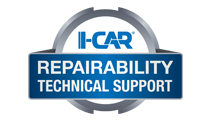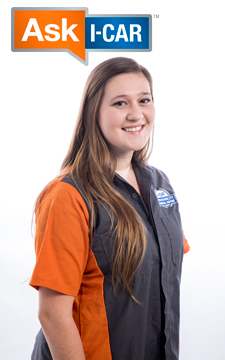OEM Restraints System Part Replacement Search
2018 Nissan Versa Note
Share:
|
DISABLE PROCEDURE AND TIME (Always Check Service Manual)
WARNING:To avoid rendering the SRS inoperative, which could increase the risk of personal injury or death in the event of a collision which would result in air bag inflation, all maintenance must be performed by an authorized NISSAN dealer.
1. Turn ignition switch OFF
2. Disconnect both battery cables
3. Wait at least 3 minutes before performing any service.
REV: 06/2019
PARTS THAT MUST BE REPLACED FOLLOWING A DEPLOYMENT
FOR FRONTAL COLLISION: When SRS is activated in a collision:• If the driver air bag has deployed: REPLACE Install with new fasteners.
• If the front passenger air bag has deployed: REPLACE Install with new fasteners
• If any of the front air bags or seat belt pre-tensioners have deployed: REPLACE the crash zone sensor(s) and bracket(s) with new fasteners
• [Deployed] driver or passenger seat belt pre-tensioner• has been activated: REPLACE seat belt pre-tensioner assemblies with new fasteners. Confirm seat belt pre-tensioner activation using CONSULT only.
• If any of the SRS components have deployed: REPLACE the Diagnosis sensor unit. Install with new fasteners.
• If the driver front air bag has deployed: REPLACE the spiral cable
• If the passenger front air bag has deployed: REPLACE the instrument panel assembly.
• Always replace instrument panel pad following front passenger air bag deployment
• Replace any seat belt assembly if: The seat belt was in use at the time of a collision (except for minor collisions and the belts, retractors and buckles show no damage and continue to operate properly).
• If any component of seat belt assembly is questionable, do not repair. Replace the whole seat belt assembly
For Side and Rollover Collision:
• If the side curtain air bag LH has deployed: REPLACE the side curtain air bag module LH. Install with new fasteners.
• If the side curtain air bag RH has deployed: REPLACE the side curtain air bag module RH. Install with new fasteners.
• If either the front LH or front RH side air bag modules has been deployed: REPLACE front seatback assembly on the deployed side.
• If any of the SRS components have deployed: REPLACE the side air bag (satellite) sensor on the collision side with new fasteners
• If any of the SRS components have deployed: REPLACE the door (satellite) sensor on the collision side with new fasteners
• If any of the SRS components have deployed: REPLACE the diagnosis sensor unit with new fasteners.
• [Deployed] driver or passenger seat belt pre-tensioner• has been activated: REPLACE seat belt pre-tensioner assemblies with new fasteners. Confirm seat belt pre-tensioner activation using CONSULT only.
• Replace any seat belt assembly if: The seat belt was in use at the time of a collision (except for minor collisions and the belts, retractors and buckles show no damage and continue to operate properly).
PARTS THAT MUST BE INSPECTED AND REPLACED IF DAMAGED
Replace any SRS components and the related parts showing visible signs of damage (dents, cracks, deformation).For front air bag deployment:
• Non-deployed airbags
• Steering wheel and harness built into the steering wheel.
• Spiral cable, If the driver front air bag has not deployed
• Crash zone sensor
• Seat belt pre-tensioner assemblies (All applicable locations: buckle, retractor, lap outer)
• Occupant classification system (Passenger seat)
• Harness and connectors, If damaged—REPLACE the damaged harness. Do not attempt to repair, splice or modify any SRS harness.
• Instrument panel assembly, if the passenger front air bag has NOT deployed
• Replace any seat belt assembly if: The seat belt was in use at the time of a collision (except for minor collisions and the belts, retractors and buckles show no damage and continue to operate properly), the seat belt was damaged in an accident, the seat belt attaching point was damaged in an accident or if the anchor bolts are deformed or worn out.
• Inspect the seat belt attaching area for damage or distortion and repair as necessary before installing a new seat belt assembly.
• Inspect the supplemental restraint System component attaching areas for damage or distortion and repair as necessary before installing new components.
For Side and Rollover Collision:
• Non-deployed airbags
• Side air bag (satellite) sensor (LH or RH)
• Door (satellite) sensor (LH or RH)
• Center inner pillar
• Seat (if equipped with front side air bag)
• Trim/headlining on the collision side
• Replace any seat belt assembly if: The seat belt was in use at the time of a collision (except for minor collisions and the belts, retractors and buckles show no damage and continue to operate properly), the seat belt was damaged in an accident, the seat belt attaching point was damaged in an accident or if the anchor bolts are deformed or worn out.
• Inspect the seat belt attaching area for damage or distortion and repair as necessary before installing a new seat belt assembly.
• Inspect the supplemental restraint System component attaching areas for damage or distortion and repair as necessary before installing new components
• Harness and connectors, If damaged—REPLACE the damaged harness. Do not attempt to repair, splice or modify any SRS harness.
• Occupant classification system (Passenger seat)
• NISSAN recommends that all seat belt assemblies in use during a collision be replaced unless the collision was minor and the belts show no damage and continue to operate properly. Failure to do so could result in serious personal injury in an accident. Seat belt assemblies not in use during a collision should also be replaced if either damage or improper operation is noted.
| Additional Information |
*This matrix does not currently contain all production vehicles sold in the United States. Please refer back to this page frequently to ensure the most up-to-date information. The following charts were developed in cooperation with AudaExplore, a Solera company. The contents are based on the information available at the time of publication. To ensure that the most recent information is used, always refer to the vehicle maker's technical information before working with airbags and other passive restraint systems.









